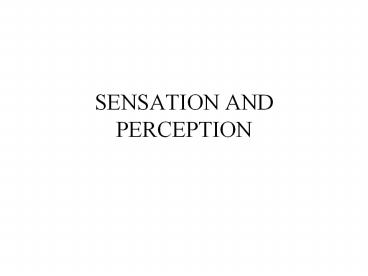SENSATION AND PERCEPTION - PowerPoint PPT Presentation
Title:
SENSATION AND PERCEPTION
Description:
Smell (olfaction) Taste (gustation) Vestibular sense (balance) Kinethesis (body movement) ... Smell and Taste. Olfaction (smell) receptors are located at top of ... – PowerPoint PPT presentation
Number of Views:131
Avg rating:3.0/5.0
Title: SENSATION AND PERCEPTION
1
SENSATION AND PERCEPTION
2
KEY POINTS
- Distinguish between sensation and perception
- Psychophysics absolute threshold and difference
threshold - Identify each major sensory system, their
receptors, and type of sensory information each
receives - Perception selection, organization and
interpretation
3
Sensation
- Input of sensory information
- Process of receiving, converting, and
transmitting information from the outside world
4
Sensory Systems
- Vision
- Hearing
- Smell (olfaction)
- Taste (gustation)
- Vestibular sense (balance)
- Kinethesis (body movement)
- Touch (pressure, pain, temperature)
5
Vision
- Visual receptor cells located on retinarods for
night vision and cones for color vision - The eye captures light and focuses it on the
visual receptors, which convert light energy to
neural impulses sent to the brain
6
Hearing
- Audition (hearing) occurs via sound waves, which
result from rapid changes in air pressure caused
by vibrating objects - Receptors located in the inner ear (cochlea) tiny
hair cells that convert sound energy to neural
impulses sent along to brain
7
Smell and Taste
- Olfaction (smell) receptors are located at top of
nasal cavity - Gustation - (taste) receptors are taste buds on
tongue. Four basic tastes sweet, salty, sour
and bitter
8
Body Senses
- Vestibular sense (sense of balance) results from
receptors in inner ear - Kinethesis - (body posture, orientation, and body
movement) results from receptors in muscles,
joint and tendons - Skin senses detect touch (pressure, temperature
and pain)
9
Processing
- Sensory reduction - filtering and analyzing of
sensations before messages are sent to the brain - Transduction - process of converting receptor
energy into neural impulses the brain can
understand - Adaptation- decreased sensory response to
continuous stimuli
10
Psychophysics
- Study of the relationship between the physical
properties of stimuli and a persons experience
of them - Absolute threshold - minimum amount of energy we
can detect - Difference threshold - (jnd) the smallest change
in a stimulus we can detect
11
Perception
- a constructive process by which we go beyond
the stimuli that are presented to us and attempt
to construct a meaningful situation.
12
Perceptual Processing
- Top-down perception is guided by higher-level
knowledge, experience, expectations, and
motivations - Bottom-up perception that consists of
recognizing and processing information about the
individual components of the stimuli
13
Perception-Key Concepts
- Selection
- Organization
- Interpretation
- Subliminal perception and ESP
14
1. Three Major Factors of Selection
- Selective attention
- Feature detectors
- Habituation
15
2. Organization
- Form (Gestalt)
- Constancy(size, shape, color, brightness)
- Depth
- Color
16
Gestalt Principles
- Rules that summarize how we tend to organize bits
and pieces of information into meaningful wholes
17
Gestalt Psychology Form
- figure ground
- proximity
- closure
- contiguity
- similarity
18
Constancy
- Size constancy
- Shape constancy
- Color constancy
- Brightness constancy
19
3. Four Major Factors of Interpretation
- Perceptual adaptation
- Perceptual set
- Individual motivation
- Frame of reference
20
Subliminal Perception
- Stimuli that occur below the threshold of our
conscious awareness but have a weak, if any
effect on behavior
21
4. Extrasensory Perception (ESP)
- Alleged perception in the absence of sensory data
- Types of ESP - telepathy, precognition,
clairvoyance, and psychokinesis































